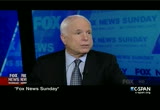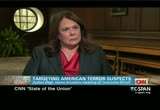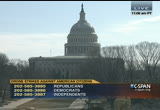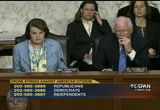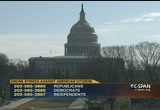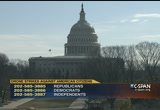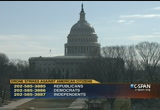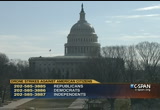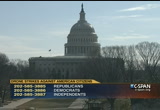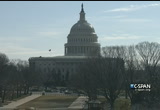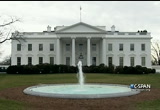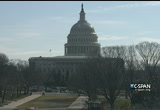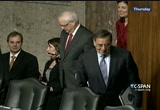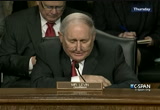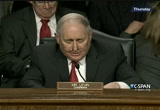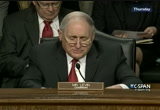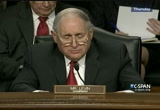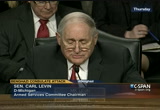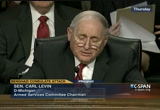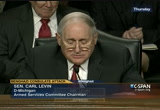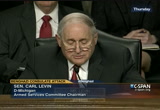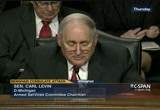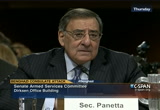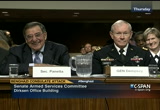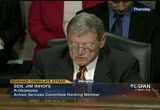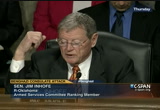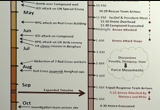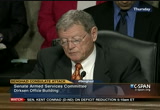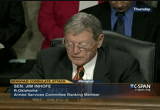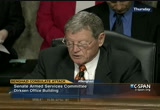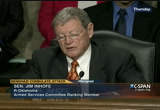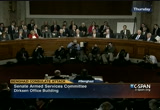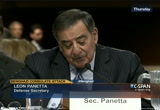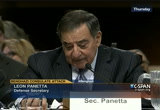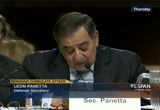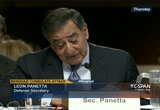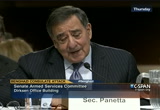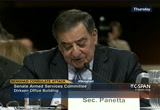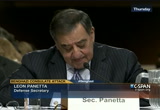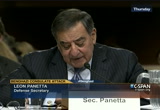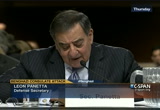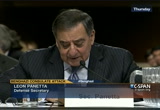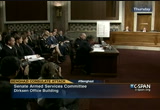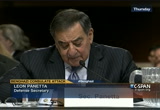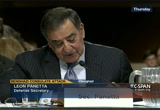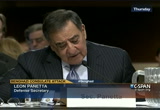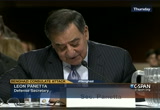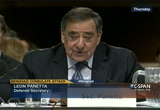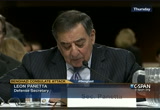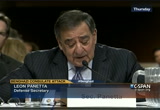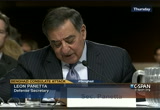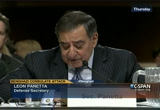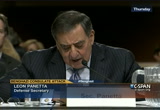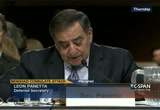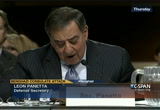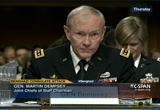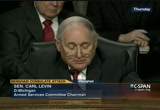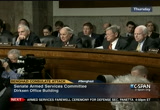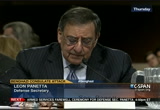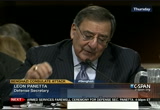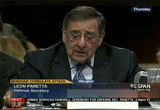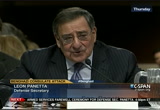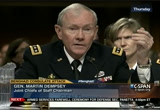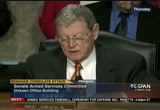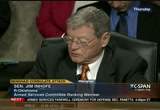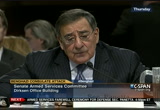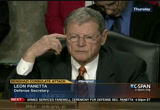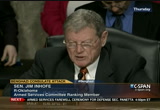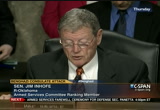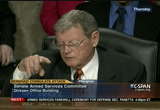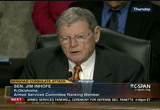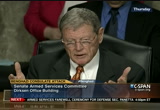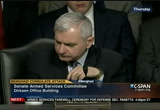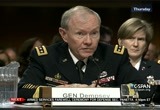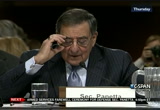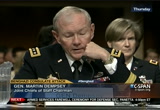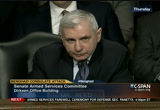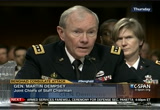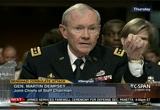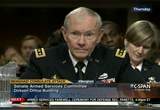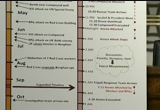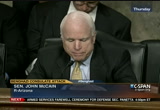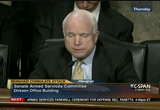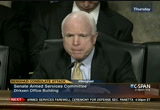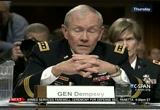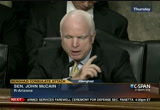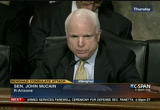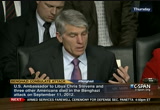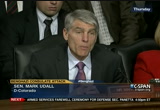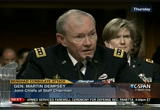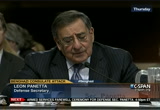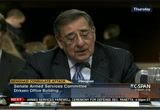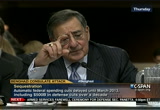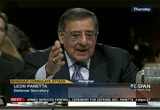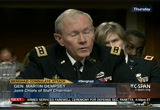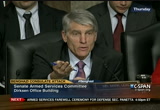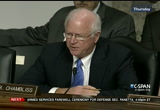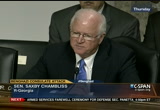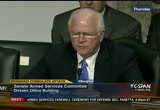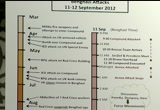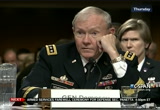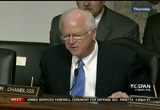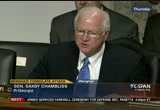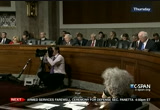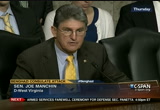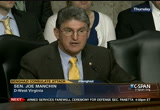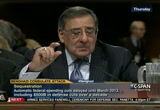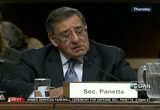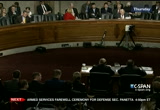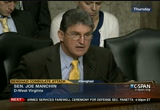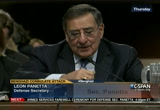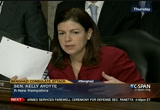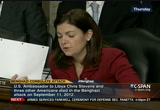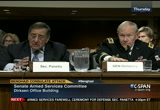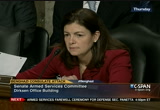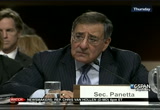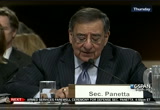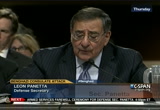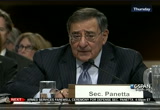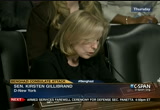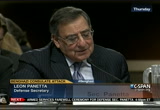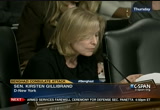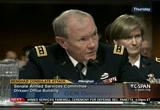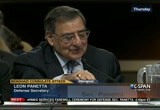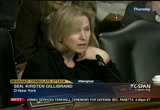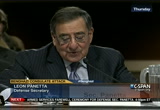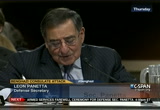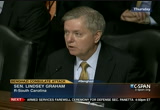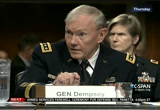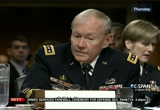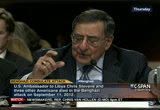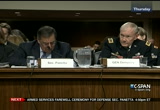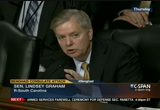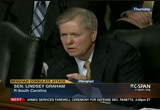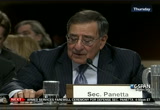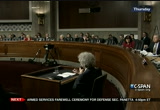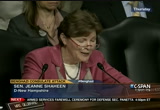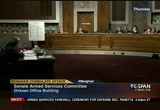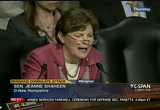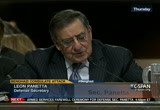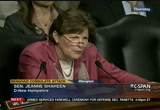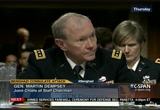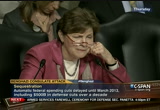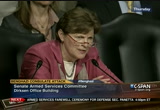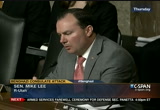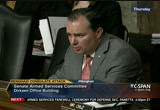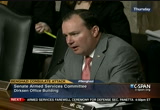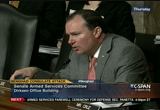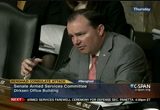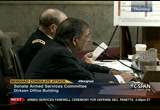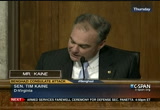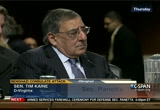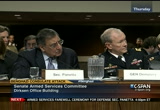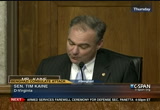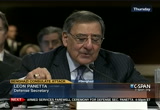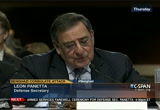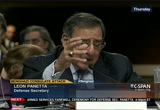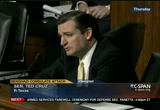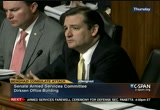tv Attack on U.S. Consulate in Benghazi CSPAN February 10, 2013 2:05pm-4:45pm EST
2:05 pm
we are in a strange conundrum. you can kill an american citizen overseas, but if you capture them in the united states to have to be read their miranda rights. what's wrong with that picture? >> the rules and practices the obama administration has followed are quite stringent and are not being abused. who is to say about a future president? i think this idea of being able to execute an american citizen no matter how awful, having some third party having a say or perhaps and forming the congress or the intelligence committee, something like that. some check on the ability of a president to do this has merit as we look towards the longer-
2:06 pm
term future. >> we are taking your calls on drone strikes. robert is waiting on the line from miami, florida. hello. go ahead. caller: yes. host: what do you think? caller: they said that are targeting americans? , yes.that's right moving on. on the independent line from wisconsin. caller: hello. i think once you start to kill americans were designed to americans, you become an enemy. if you are a citizen of the united states, you have become the enemy. i do not see anything wrong with using drone strikes to take them
2:07 pm
2:08 pm
1r ectives, one being 5240- there is the required targeting of citizens, targeted hits for certifications of these drawings. some are purchased by organizations and various agencies. they are hitting civilians whether it is just electromagnetic or i pray that they are not killing innocent citizens. this is a question here. 30,000 additional drones to be
2:09 pm
released, tested, and evaluated over the united states? i think america needs to wake up. 30,000 additional draws while we have homelessness, veterans returning, you can put that kind of money over the united states of america. there are too many directives out there and contractors who are now using these devices targeting citizens as we sit here today. host: senator mccain of arizona said the drop program should fall under the pentagon, not the cia. you can listen to rebroadcast on c-span radio today. richards in result -- richard is on the line. what do you think about the
2:10 pm
drone's strikes? >> it is very vast modern-day technology. there will always be people killed a matter what we do. we have to grow up and understand that. the aclu is the biggest group of nuts on the planet. thank you. host: edmond, oklahoma. caller: i would just like to say one thing. the aclu is on the front of maintaining our constitutional rights. you may not agree with some of , but iflenges, i don't things they overall doing a good job. as far as the drones, they're working in that uncovered.
2:11 pm
in pakistan. i live in oklahoma and it has been in the paper recently that we have drone's being used here. one of your previous caller said there was a bill. from what i understand, we already have them here. we have a republican governor right now is in violation is not transparent, taking orders from right wing not jobs back east. and she now has these drones at her disposal. host: we heard earlier from former defense secretary robert gates to said earlier the number of innocent victims were extremely small and it does not outweigh the benefits of using drones. john is on the line from
2:12 pm
philadelphia, pennsylvania. caller: i think the usage of drones is advanced military and i do agree with the previous caller, but it is modern warfare. if they think about our societal issues within politics, it is all self interest. as people were talking about earlier withdrawals being used on innocent civilians, it would be very corporate-based. we have major lobbyists the lobby are politicians. we just need to be more stringent with our constitutional rights and our congress overseeing the usage of drones. i do agree that it should be a department of defense authorization instead of the cia. political issues, what ever. i have heard that we have over
2:13 pm
5000 in circulation. personally, i do not think it should be used against altai the orbit just the years the house -- or just be used as an early detection system. host: moving on to gainesville, florida. caller: i think they're ok to use against the enemies of our country, but just american citizens, it is a violation of the 14th amendment. you have our government that needs to try to follow the constitution. host: colleyville, texas. go ahead. caller: i came from vietnam as a
2:14 pm
refugee. when i got amnesty, i support president obama. the reason is because the people -- they are not in the position to see the danger. look back on the u bomb. they send the bomb and chemical. what we do? let them free? host: 1 must call. credit are in democratic line. -- craig on the democratic line. caller: if any american citizen, including myself, take up arms against the government of america and i have taken it upon
2:15 pm
myself to join and allocating -- al qaeda or affiliate organization, i am subject to whatever punishment our government has deemed it necessary to alleviate the threat. that is part of the authority given of the executive 40 given the us why do not understand what the big issue is with this president using has been blown out of proportion. our soldiers are on the ground using an m-16 doing the same thing. host: thank you for all of your calls today. we will open the phone when the data tomorrow on "washington
2:16 pm
2:18 pm
we are here to talk about the attack are indeed temporary and next in benghazi libya are in september 11th and 12th last year and the internal review following that attack including lessons learned from benghazi. i'd just want to remind colleagues that we will be receiving testimony next tuesday morning on the impact of sequestration adnor -- and/or a continuing resolution. i hope that today's hearing will inform the committee of any changes that have been made or are being proposed to the posture of u.s. forces overseas to respond to similar terrorist attacks in the future that we sought in benghazi.
2:19 pm
anything that will affect the dod and installations overseas. they released a timeline of its response to the assaults of september 11th and 12th and including on the deployment of various forces based in the united states or overseas. a copy of this timeline is in front of us. i think we will each have it and it will be included in the record. according to the timeline, the temporary mission facility, the department of defense's first reaction was to react on a mission of libya to provide better awareness of the events of the events in benghazi. there were a series of meetings in the pentagon for expanding the department of defense's response as well as to prepare
2:20 pm
for the potential outbreak of further violence throughout the region. during these meetings, secretary panetta authorized a number of deployments. i hope that secretary panetta and the chairman will provide the committee with detail on the circumstances that led them to these decisions. ance september, there's been great deal of focus on the supporting role that the marine corps guards play in many u.s. diplomatic missions abroad. the marine corps did not have an element in benghazi. the committee will be closely monitoring the use of these marines. our fiscal year 2013 national defense authorization act that requires the secretary of defense to conduct an assessment of the mission of the
2:21 pm
marine security guard program, whether it should be expanded and to report to congress on the results of this review. more immediately, the provision requires the secretary to develop a plan to increase the number of marines in the marine security guard program by up to 1,000 marines to improve security at our embassies, consulates and other diplomatic facilities. based on secretary clinton's recent testimony before congress, it is clear that the state department and the department of defense are already consulting on this review, high-threat posts as well as posts where the host nation, despite having the will
2:22 pm
to protect diplomatic facilities does not have the capacity to protect them. in some cases, these posts are located in countries where the department of defense and the state department have assistance programs with similar objectives. these are perhaps areas where the two departments can explore whether additional collaboration is appropriate. during secretary clinton's testimony before congress, she talked about the importance of properly resourcing africa command. they reached full operational capability less than five years ago and has been an -- what's called an economy of force effort to date. the events of last september raised questions about the adequacy of the department of defense's resourcing with respect to africom in terms of funding, assigned personnel,
2:23 pm
intelligence, surveillance and reconnaissance support. as an example, until the beginning of the current fiscal year, africom did not have a dedicated commanders and extremist force which is an emergency stand-by force, but rather it shared its force with u.s.-european command. in recent years, the committee has sought to provide the department of defense with flexible africom specific authorities to support the burgeoning requirements of the command. such as the african cooperation authority, targeted train and equip authorities to support deployments of the african mission in somalia and flexible military construction authorities. the committee looks forward to learning whether any additional actions might be taken to further support africom's
2:24 pm
programs and operations. unfortunately to date, much of the discourse about the events surrounding the deadly attack against our facilities and people in benghazi have focused on the preparation and dissemination of unclassified talking points that were prepared at the request of congress by our nation's intelligence professionals and approved by their most senior leadership. these talking points are relevant, but even more relevant and finding out, as secretary clinton said, why these militants decided why they did is to find those militants and to bring them to justice and to do everything wreck to prevent it from ever happening again. since the events in benghazi, individuals and groups with the same motivations as those that attacked the u.s. facility in benghazi have attempted to
2:25 pm
expand their territory in the nation of mali as well as take hostage dozens of innocent civilians and attempt to destroy a natural gas facility in algeria. today, the united states is provided its unique enabling capabilities to the french military operations and the deployment of african forces from nations around the region. as secretary panetta has stated repeatedly, it is critical that the united states continue to pursue those groups and individuals seeking to attack the united states and our interests. i expect the secretary and the chairman this morning will provide their assessment of the threat that's posed by these groups to regional and international security as well as our effort to counter their operations. the four americans that our nation lost last september were among the very best expression
2:26 pm
of what it means to be an american. hardworking, energetic, optimistic, dedicated, not just to furthering the interests of their own nation but to ensuring that others could enjoy the same freedom and opportunity that we hold so dear. we honor the sacrifice of those americans and in their name we will do everything that we can to prevent a repetition of benghazi. since this is likely secretary panetta's last hearing before this committee, and a broad smile has now appeared upon his face, i want to take a moment to offer my personal thanks to secretary leon panetta for your service to our country, for your leadership at the defense department, secretary panetta, you have exhibited qualities of honesty, candor, humility, fair mindedness and a great sense of humor.
2:27 pm
all of those were essential during the tenure that you've had as secretary. so we thank you, leon, for your service to our nation and for your great cooperation as well as with this committee. [applause] senator inhofe. >> thank you, mr. chairman. i agree with the last part of your statement there. i hold both of our witnesses in highest regard. in the case of secretary panetta, i just whispered to my friend, senator mccain, that two of my favorite democrats in the house were mineta and panetta. that's always been the case. i rejoiced at the time that you received the positions in the appointments that you have had. it's long overdue that this committee is holding a hearing
2:28 pm
to examine the facts surrounding the terrorist attacks in benghazi on slept 11, 2012. that left four americans dead, deaths that i believe could have been prevented. but it's become clear over the last five months that the united states is willfully unprepared for what occurred in benghazi. what's also been clear is following the attack, the administration provided the american people inaccurate information about the true nature of the catastrophe and those events in benghazi. in my discussions with the most senior administrative officials, i've been told on the night of the tragedy -- although there was confusion about the nature of the first attack on the compound where the ambassador was located -- the second wave of attacks, which was on the annex, were unequivocally a terrorist attack. i have no doubt about that that
2:29 pm
they were. this was apparent because an angry mob doesn't use coordinated mortars and r.p.g.'s, so i have no question about that in my mind. despite the clear evidence, it took this administration over a week to publicly admit, as many of us knew already, that the -- it was a terrorist attack, not simply a protest, that turned violent as ambassador susan rice adamantly and incorrectly insisted. while some may downplay the indifference, i can't. al qaeda, affiliated terrorists were involved in the murder of four americans, including our united states ambassador to libya. this fact should call into question the effectiveness of our counterterrorist -- counterterrorism strategy in north african and beyond. i hope our hearing today will provide the committee a thorough accounting of what's been done in months following to ensure that this tragedy doesn't happen again.
2:30 pm
in the months leading up to the september 11, there were no fewer than four significant attacks against the western interests in the city. i'd like to have you go ahead and put that chart up. and leave it up during the course of this hearing because each member up here has a copy of this. there are certain things that happened we all know. we know on may 22 the red cross was hit with an r.p.g. they left town. we know on june 11, the british ambassador's motorcade was attacked by an r.p.g. they left town. we know on april 10 the united states convoy was hit by an i.e.d. and on june 6, the u.s. consulate was attacked with a bomb and many, many other things.
2:31 pm
but we stayed. we didn't leave. while i understand the state department has primary responsibility for the protection of american diplomats around the world, i also understand that the defense department plays an important role -- supporting role to this effect. i expect our witnesses to explain today why, given the clear indication -- indicators tanned warnings, threats to the united states interests in benghazi and throughout the north africa were growing was the -- was the defense department not placed on a heightened alert status or adequately postured to respond in a timely manner to a contingency of this nature, especially on the anniversary of 9/11. our witnesses have repeatedly stated that there were no military assets in the region available that could have acted in time, potentially to avert this disaster, and i have to ask why not. the january, 2012, defense strategic guidance directs that we will rebalance toward the asian pacific. it goes on to say in africa and latin america we will develop
2:32 pm
innovative, low cost and small footprint approaches to achieve our security objectives. i don't agree. that's no way to achieve our security objectives. benghazi highlights the strategic risks of these new strategies in places like africa, risks certain to be amplified by cuts. this committee must get a thorough accounting exactly what was known and when and what the defense department did to respond to the escalating situation in benghazi and why it was not better prepared. additionally, our witnesses should address whether or not the current relationship between the state and the defense department is sufficient to meet the security demands of our overseas presence. you know, i've made over 100 african country visits. i know africa, and what happened in benghazi vividly illustrates what i've been talking about for a long period of time.
2:33 pm
that is the growing threat to the united states' interest on the african continent from the terrorist groups such as al qaeda, islamic maghreb and boko haram. one said back in 2011 that terrorist organizations in east africa in the deserts of northern africa and nigeria, quote, have little explicity and publicity voiced intent to target westerners and the u.s. specifically. secretary panetta, the same year you said, quote, the longer you delay the longer you avoid trying to assign some assistance there, the more dangerous these groups become and the greater the instability that develops there. there are elements there in central africa that either have ties to al qaeda or that present the forces of terrorism in their own.
2:34 pm
and that's what's dangerous. as bad as everything that i've stated is, what i think is worse is the cover-up. it was obvious from the information we had on september 11 that the second wave, not the first wave, the second wave -- we have two different waves there. we have the compound, which we'll talk about in more detail during the questions, and then we have the annex. that the second wave of attacks on the annex were unequivocally a terrorist attack and we knew it right at the time. despite this information, ambassador rice said something that was totally false to the american people on all five
2:35 pm
major sunday news shows implying that the attacks were response to an anti-islam video that spurred protests across the region. in this sense, you are probably wrong -- the wrong witness to have here because you'd be unfamiliar actually who instructed her to say that and gave her that faulty information. that's something that we hope we'll be able to get and that's something we can't be ignored. we sit along all day long and talk about the resources we should have and don't have, not just here and this part of the world but all over the world and that's fine. >> mr. chairman, senator inhofe, i appreciate being here to discuss the facility attacks in benghazi on september 11, 2012. before i go into my testimony, let me say my deepest thanks for all of you for your support and friendship that i've had with all of you on both sides of the aisle. i have had in many ways to live the american dream as a son of italian immigrants in the various capacities that i've
2:36 pm
had to serve this country. the greatest privilege i think i've had is to serve as an elected member in the house and had the opportunity to work with many of you in that capacity, and then as member of the executive branch, had the opportunity to work with you as well. i thank you for your dedication to the country and i thank you for your willingness to serve the united states. on that tragic day, as always, the department of defense was prepared for a wide range of contingencies. just remind you that the nctc in the six months prior to that attack, identified some 281 threats to u.s. diplomats, diplomatic facilities, embassies, ambassadors and consulates worldwide, and obviously benghazi was one of those almost 300 areas of
2:37 pm
concern. but unfortunately there was no specific intelligence or indications of an imminent attack on that u.s. facility in benghazi. and frankly without an adequate warning, there was not enough time given the speed of the attack for armed military assets to respond. that's not just my view or general dempsey's view. it was the view of the accountability review board that studied what happened on that day. in the months since the tragedy at the temporary mission facility in the nearby annex in benghazi, we've learned that there were actually two short duration attacks that occurred
2:38 pm
some six hours apart. and again, there was no specific intelligence that indicated that a second attack would occur at the annex which was located some two miles away. the bottom line is this -- that we were not dealing with a prolonged or continuous assault, which could have been brought to an end by u.s. military response. very simply, although we had forces deployed to the region. time, distance, the lack of inadequate warning -- of an adequate warning prevented a more immediate response. despite the uncertainty at the time, the department of defense and the rest of the united states government spared no effort to do everything we could to try to save american lives. before, during and after the
2:39 pm
attack, every request the department of defense received we did, we accomplished. but, again, four americans' lives were lost, and we all have a responsibility to make sure that does not happen again. the four americans who perished in benghazi, ambassador stevens, information management officer sean smith and the security personnel, glen doherty, tyrone woods, all were heroes and all were patriots. i had the opportunity to join the president, secretary clinton and other officials at andrews air force base for the dignified transfer ceremony when those bodies of those heroes were returned home and i had the opportunity to meet with their families.
2:40 pm
i believe we all have a solemn responsibility for the families and to the personnel who put themselves at risk to find out exactly what happened, to bring those involved to justice and to make sure that we're doing everything possible to prevent it from happening again and to ensure the safety of our personnel and facilities worldwide. to that end, the department of defense has fully supported efforts by the congress and the state department to review the events and decisions surrounding the attacks in benghazi. we've made every effort to respond promptly for additional requests, to provide briefings, to provide testimony to committees and members in the congress. in fact, general dempsey and i
2:41 pm
were among the very first u.s. government senior officials to brief congress on this tragedy. we appeared before this committee on september 14, 2012, three days after the attack. and provided the best information we had at that point as to what had taken place. additionally, the defense department participated in classified briefings and answered questions from the intelligence, foreign affairs, homeland committee, oversight committees, even when we were not called to testify. we've also provided all requested support to the accountability review board that was co-chaired by ambassador pickering and by admiral mullen. in fact, in many places, if we get the heads up that we need, the changes we made have already resulted in early decisions to
2:42 pm
deploy additional security or withdraw diplomatic staff in the advance of a crisis, from central america, from car whom, to tunisia, from egypt to mali and others. while d.o.d. does not have primary responsibility for the security of u.s. diplomatic facilities around the world, we do work closely with the state department and support them as requested. in the months prior to the benghazi attack, as i've said, we had received from the intelligence community almost 300 reports on possible threats to american facilities around the world. over the course of the day on september 11, general dempsey and i received a number of reports of possible threats to u.s. facilities, including those in cairo, egypt, but there were no reports of imminent threats to
2:43 pm
u.s. personnel or facilities in benghazi. by our best estimate, the incident at the temporary mission facility in benghazi began at about 3:42 p.m. eastern daylight time on september 11. the embassy in tripoli was notified of the attacks almost immediately, and within 17 minutes of the initial reports, about 3:59 p.m., africom directed an unmanned, unmanned surveillance aircraft that was nearby to reposition overhead the benghazi facility. it was focused on the primary facility there to try to determine what was taking place. soon after the initial reports about the attack in benghazi, we received, general dempsey and i met with president obama and he ordered all available d.o.d. assets to respond to the attack in libya and to protect u.s.
2:44 pm
personnel and interests in the region. it's important to remember that in addition to responding to the situation in benghazi, we were also concerned about potential threats to u.s. personnel in tunis, tripoli, cairo, sanaa and elsewhere that could potentially require a military response. in consultation with general dempsey, and africom commander general hamm, i directed several specific actions. first, we ordered a marine fleet anti-terrorism secure team, a fast team, stationed in spain to prepare to deploy to benghazi. a second fast platoon was ordered to prepare to deploy to the embassy in tripoli. a special operations force,
2:45 pm
which was training in central europe, was ordered to prepare to deploy to an intermediate staging base in southern europe, sigonella, and a special operations force based in the united states was ordered to deploy to an intermediate staging base in southern europe as well at sigonella. some ask why other types of armed aircraft were not dispatched to benghazi. the reason simply is because armed u.a.v.'s, ac-130 gun ships or fixed wing fighters with the associated tanking, you've got to provide air refueling abilities, armaments. you got to arm all the weapons before you put them on the planes. targeting and support facilities were not in the
2:46 pm
vicinity of libya. and because of the distance, it would have taken at least nine to 12 hours, if not more, to deploy these forces to benghazi. this was pure and simple. in the absence, as i said, of any kind of advance warning, a problem of distance and time. frankly, even if we were able to get the f-16's or the ac- 130's over the target in time, the mission still depends on accurate information about what targets they're supposed to hit. and we had no forward air controllers there. we had no communications with u.s. personnel on the ground, and as a matter of fact, we had no idea where the ambassador was at that point to be able to kind of conduct any kind of attacks on the ground. the quickest response option available was a tripoli base security team that was located at the embassy in tripoli.
2:47 pm
and to their credit within hours, the six-man team, including two u.s. military personnel, chartered a private airplane deployed to benghazi. within 15 minutes of arriving at the annex facility, they came under attack by a mortar and rocket-propelled grenades. members of this team, along with others at the annex facility, provided emergency medical assistance and supported the evacuation of all personnel. only 12 hours after the attacks had begun, all remaining u.s. government personnel had been safely evacuated from benghazi. looking back, our actions and the immediate -- in the immediate aftermath of these attacks have been subject, obviously, to intense scrutiny and review. but let me share with you the conclusion of the accountability review board, which i believe accurately assessed the situation, and i quote, the interagency response
2:48 pm
was timely and appropriate, but there simply was not enough time, given the speed of the attacks, for armed u.s. military assets to have made a difference. senior level interagency discussions were under way soon after washington received initial word of the attacks and continued throughout the night. the board found no evidence of any undue delays in decisionmaking or denial of support from washington or from the military combatant commanders. quite the contrary. the safe evacuation of all u.s. government personnel from benghazi 12 hours after the initial attack and subsequently to rhyme stein air force base was the response of exceptional government coordination and military response and helped save the lives of two severely wounded americans. still, after all of that, it is clear that there are lessons to be learned here.
2:49 pm
and steps that must be taken to ensure that we're doing everything possible to protect our personnel and our facilities abroad. so in concert with the state department and the intelligence community, we are in the process of developing enhanced security for u.s. persons and facilities in the wake of benghazi. there will always be attention between the effectiveness for personnel, the ability to get out and do what they're supposed to do in these countries and their physical security. we're committed to steps to avoid a bunker mentality and yet we still must afford greater protection from armed attacks. we're taking steps along three tracks. first, host nation capacity. we have been able to better assess and build up the capabilities of host governments to provide security for u.s. personnel and facilities. the fact is, as you all know, that our embassies and
2:50 pm
consulates depends on host country personnel to provide the first line of security. and this episode raises concerns about the ability of some newly established or fragile governments to properly secure u.s. diplomatic facilities. to address these concerns, we are working with the state department and considering how d.o.d. can better help host nations enhance the security provided to a diplomatic facility. we're -- where permissible and appropriate in collaboration with the secretary of state and the u.s. chief admission in the u.s.-affected country, we believe the defense department can assist using a range of security assistance authorities to train and equip those forces
2:51 pm
in the host country, and we are doing exactly that. secondly, we have to enhance diplomatic security. we got to harden these facilities, and we again are working with the state department to try to reassess diplomatic security overall. to determine what changes may be required, we assisted the state department in a deployment of an interagency security assessment team to evaluate the security level at 19 vulnerable diplomatic facilities, including our embassy in libya. and we're in the process of developing recommendations on potential security increases as required. as part of this review, we have also considered how the role, mission and resourcing of the marine security guards could be adapted to respond to this new threat environment. in the near term, we've agreed with the department of state to add 35 new marine security guard detachments. that's almost 1,000 marines
2:52 pm
over the next two or three years. in addition to the 152 detachments that are in place today. we're working with state to identify those specific locations for the new detachments, and we will identify any necessary resource adjustments in order to support this initiative. although there was not a marine security guard detachment posted through the benghazi temporary mission facility, based on our review of all embassy security embassy security incidents that occurred in september of 2012 in tunis, in khartoum and sanaa, we've went beyond their primary mission of protecting classified information. as some of you know, their primary mission is not to
2:53 pm
providing outside security. their primary mission is to protect classified information. but we believe that we can try to augment their role in terms of providing greater security protection as well. this could include the expanded use of nonlethal weapons, additional training and equipment to support the embassy regional security officers' response options when host nation security force capabilities are at risk of being overwhelmed. the third area is enhanced intelligence and military response capacity. we are focused on enhancing intelligence collection and ensuring that our forces throughout the region are prepared to respond to crisis if necessary. the united states military, as i've said, is not and frankly should not be a 911 service capable of arriving on the scene within minutes to every possible contingency around the
2:54 pm
world. the u.s. military has neither the resources nor the responsibility to have a fire house next to every u.s. facility in the world. we have some key bases, particularly in this region. we have some key platforms from which we can deploy, and we have forces on alert and we're prepared to move, but our ability to identify threats, to adjust posture, to prevent plots and respond to attacks to our personnel at home and overseas depends on actionable intelligence, and it always will. therefore, we're working with the state department and the intelligence community to ensure that our collection and analysis is linked with military posture and planning.
2:55 pm
oure working to enhance intelligence collection, to improve the responsiveness of contingency assets and to adjust the location of reaction forces. at the same time we are working closely to state to make sure they have our best estimate of response times for each at-risk diplomatic facility so they can make the best informed decisions about adjustments to their staff presence in areas of increased security threat. we've deployed key response forces abroad. we have reduced their response time, but let me again say to you that even those forces that are on a tight alert time of n plus two, notice plus two hours in order to get on a plane, once those forces are put on airlift, it still requires many hours in that part of the world to fly distances, long distances in order to be able to respond.
2:56 pm
i firmly believe that the department of defense and the u.s. armed forces did all we could do in the response to the attacks in benghazi. we employed every asset at our disposal that could have been used to help save lives of our american colleagues. we will support efforts to bring those responsible to justice, and we are working with the task force involved and headed up by the f.b.i. to do just that. as i said going forward, we intend to adapt to the security environment, to ensure we are better position and support the department of state in securing our facilities around the world. but in order to be able to effectively protect the american people and our interests abroad, at a time of instability we must have an agile and ready force able to quickly respond. and above all, and forgive me
2:57 pm
for being repetitious, we have got to end the cloud of budget uncertainty that hangs over the department of defense and the entire u.s. government. i've got to use this opportunity to express, again, my greatest concern as secretary. frankly, one of the most greatest security risks we are facing as a nation, that this budget uncertainty could prompt the most significant readiness -- military readiness crisis in more than a decade. the department of defense faces the prospect of sequestration on march 1. if congress fails to act, sequestration is triggered. and if we also must operate under a year-long continuing resolution, we will be faced with having to take about $46 billion-plus out of the defense budget and we will face a budget shortfall.
2:58 pm
with only a few months remaining in the fiscal year. protecting the war fighters, protecting the critical deployments we have, we're going to have to turn to the one area that we have in order to gain the funds necessary and that's readiness. it's maintenance. this will badly damage our national defense and compromise our ability to respond to crises in a dangerous world. the responsibility of dealing with this crisis obviously rests with the leadership of the nation. i know the members of this committee share the deep concerns that i've raised about sequestration, and obviously i urge you to do whatever you can to try to avoid this threat to our national defense. the state department and the intelligence community obviously also must be provided the resources they need in order
2:59 pm
to execute the missions that we expect of them, including the enhancements that i described today. whatever steps are required to be taken to properly posture, u.s. forces for possible emergency response operations, those steps would be seriously impacted by the readiness crisis caused by uncertain resources. we have a responsibility, and i take that responsibility seriously, to do everything we can to protect our citizens. that responsibility, however, rests with both the executive branch and the congress. if we work together, we can keep our americans safe. >> thank you seven, secretary panetta. general dempsey. >> thank you. >> thank you. i'll press my opening remarks, if you'll allow me to endorse what the secretary just said. in particular, the part of the effect of sequestration. i would also say that this
3:00 pm
hearing continues our full support to every effort and every request to understand and learn from this tragic event. i want to also commend the men and women of our nation's diplomatic corps. they're selfless and courageous. they do hard things in hard places. i stood with them in iraq and in afghanistan where their words are america's reputations and where their outstretched hands are america's promise. and benghazi we lost four fellow servants, chris stevens, sean smith, tyrone woods and glen doherty. we mourn their deaths even as we honor their service. we honor them most by taking what we learned from their loss to prepare for an uncertain future. thank you. >> thank you very much, general dempsey. let's have a seven-minute round for the first round to get everybody.
3:01 pm
if we need a second round we can do it. we've had a late start this morning. you ended with your plea on sequestration and your need to-- the need to avoid it. i totally agree with you. there is near universal agreement, perhaps universal on this panel, about the devastating impacts that sequestration is likely to have on the department of defense and on other federal agencies as well. i believe, as you do, that it is incumbent on congress and the executive branch to work together to avoid sequestration. toward that end, i, as one member of the senate, have advocated for a balanced solution to sequestration that includes both revenues and spending cuts. i suggested a specific proposal that would raise revenues by closing loopholes that some corporations use to avoid taxes by shifting income outside of the united states. i've worked with colleagues in
3:02 pm
the senate on suggested solutions. i'll continue to do so and your clarion call here this morning, i hope it will encourage all of us to work in any way that we can to avoid sequestration. you've -- yesterday you spoke at georgetown and announced a series of steps that the department will have to take almost immediately with respect to deployments, maintenance, contracts, other obligations if the congress and the president don't act soon to address the issue. we received memoranda from other senior department of defense officials laying out steps that would have to be taken if sequestration is not avoided. can you give us a timetable? you've already announced some actions that you're taking, which you're putting in place now so even if we can avoid sequestration in the next few days or a week from now or two weeks from now some things are being taken even before the end
3:03 pm
of february and before we know whether we can avoid sequestration, can you tell us, first of all, whether or not these actions would be reversible if in fact we avoid sequestration in say a week from now or two weeks from now? and do you echo the president's call for a balanced approach to avoid sequestration to include both spending cuts and additional revenues? >> mr. chairman, first of all, let me -- let me indicate, and i think general dempsey can add to this, the reason we're having to do this and take actions now is because, you know, we're operating at a spend rate right
3:04 pm
now that envisions that we would have gotten an f.y. 2013 appropriations bill. unfortunately, we have no f.y. 2013 appropriations bill. we got a c.r., but we've been operating at least in these first months based on a spend rate that is in line with what we thought we were going to get for f.y. 2013. if sequester hits on march 1, and then if we get a c.r. as opposed to getting an appropriations bill, then we're going to be obligated, as you know, to take out almost $46 billion-plus out of our budget. and that would have to take place in the remaining months of this fiscal year. if we protect the war fighters, we protect those in afghanistan, if we protect some of our critical deployments, we're looking at having to take most of that, as i said, out of readiness.
3:05 pm
so what we're trying to do is to slow down that rate of spending that's going on so it will not require as deep a dive as we're going to have to have in readiness. so what we're doing, and what i urged the chairman and the service chiefs is to take steps to try to implement savings now. we've implemented a freeze on hiring. we've implemented a freeze on temporary hires. we're probably going to impact about 46,000 jobs. we are impacting about 46,000 jobs just by doing that. we're cutting back on maintenance. we're cutting back on other areas in order to try to find what we can. most of this is reversible. most of this, if we don't get sequester, we're going to be able to reverse and be able to get back on track. but obviously if we hit sequester, then, you know, some say, you know, sequester might just happen for a period of a few weeks, which i doubt frankly, if it goes into effect.
3:06 pm
but the impact of sequester then will multiply the impact on our readiness. look, there's only -- there's only one way to deal with this. i've been saying it time and time again, and i think there are members here that agree, you got to address the larger deficit issue and to address a large deficit issue and my own experience having participated in every budget summit that we've had in past years, you got to be able to develop a balanced package in order to do that. that's just the nature of dealing with the size deficit -- size of deficits that you got. my preference, frankly, is that the congress would do the big deal, get it done, get this behind us, detrigger sequester, some this constant uncertainty, -- stop this constant uncertainty, this month-to-month situation where we don't know what the
3:07 pm
hell we're going to get. that should end. in the absence of that deal, obviously i'll support whatever package you can put together to try to detrigger sequester. whatever you can do to make sure this doesn't happen. i mean, i cannot imagine that people would stand by and deliberately hurt this country in terms of our national defense by letting this take place. >> i'll only add briefly that most of the things we're doing are reversible. that is our goal, that they would be reversible. even if you reverse them it will take sometime, and i can't predict that, we're trying to stretch readiness. i want to make sure you all realize one other thing. we took the decision on the carrier postponement very seriously because there is a human dimension to this. if you're getting ready to deploy, you cancel your rent, potentially you cancel your apartment, you sell your car, you cancel education classes. there's a human aspect to this, and now we postpone it and they're still there.
3:08 pm
so the effects are felt even now. >> ok. i guess that ends my time. senator inhofe. >> thank you, mr. chairman. i think the skunk is about to arrive at the picnic, but i'd like to share a couple of things, first to clarify some things to make sure we all understand things that are facts. the national military command center -- let me get my timer going here -- at the pentagon after receiving the mish reports of the incident from the state department, notified the office of the secretary of defense and joint staff. this information quickly passed onto the two of you, is that correct? >> correct. >> general hamm, i have a great deal of respect for general hamm and his two predecessors after we developed africom. that was somewhat significant in
3:09 pm
that effort. of course, africom, with the exception of egypt, has the continent and has the control of that. it would have operational control of the d.o.d. assets in the event that action and around libya would be necessary. now, africom consistently faces resourcing shortfalls. i know sometimes you don't hear this loud and clear but we do over a period of time, we know you can't continue to expand into new areas, as we did in africom. let's keep in mind we didn't have any activity there. and you know this prior to the time we made the conscious decision after 9/11, the original 9/11, that we have a serious problem in africa and we are going to have to deal with that problem and we came up with the idea of forming five african brigades. a lot of these things are going on right now. did you have any conversation, either one of you, with general
3:10 pm
hamm regarding the security situation in north africa prior to these attacks that is the subject of today? >> senator, i'm in almost continual touch with general hamm who provides me regular reports from africom as to the issues he's dealing with. there is no question that that area of that combatant command has increased in terms of the threats that we're dealing with and it's increased in terms of the issues related to going after elements of al qaeda. >> did he ever request additional assets there, mr. secretary? >> senator, my view was whatever general hamm asked, we did more than try to respond. >> yeah, i know you did, and we did too. i talked to him about this, and we know that the assets just weren't available when you look
3:11 pm
at the other places. it's not as if only one place is on fire. they're all on fire right now, and this is the problem that we've got. the "washington post" columnist said that the president had a briefing with the principles committee review to -- in mitigation of the threats. this would have been the day before. the committee, my understanding, is made up of the secretary of defense, secretary of state, director of national intelligence and some others. were the two of you at this hearing -- this meeting, it would have been the day before, september 10? >> i believe being at that meeting that looked at what the potential threats were as a result of going into september 11. >> at that meeting -- i have a chart over here and i'm sure you had a chance to see it, knowing the chain of events that happened on the left side are things that happened prior to
3:12 pm
all of this. what i consider to be warning signals that anyone should be able to look -- recognizing the resource problem that we have. what was the assessment of the threat in libya at the time of this principles committee meeting? >> the meeting is a routine meeting. it was not uniquely focused on north and western africa, although clearly north and western africa is an area of emerging threat. >> i'm sure that subject was there. i can't imagine they would not be. the only thing i would say in criticism of you, mr. secretary , is you have said so many times and you gave such a passionate plea to resolve this
3:13 pm
problem. you have talked about the problem. you cannot continue to look at congress when in fact, we have the president's own budget on the first four years he was there, and you can say that almost all of government under his budget has increased by about 10% except for the military. i can debate with anyone who wants to debate that. that has to be said. this is a problem that we have dealt with and you have talked about. we have got to get on record that this administration has not given the priorities to the military. that is my statement. you can agree with it or not agree with it. about an hour and 20 minutes after the first attack on ben ghazi, secretary pineda, you, and chairman dempsey were at the
3:14 pm
white house for a prescheduled meeting on a different topic at that time. i think that is when tom donnellan came in and informed all of you and the president about what happened. is that the right timeframe? >> i think we have regular meetings with the president. this is one of our weekly meetings with the president. i should tell you that just before i went into that meeting, i got an update that there had been the attack there. something i introduced to the president. >> let me do this in the interest of time. i want to make two definitions here. one would be the definition, i call it the compound. some call it the temporary mission facility. it does not matter what you call it. that is what would be comparable to an embassy, but it was a compound.
3:15 pm
the other is on the annex. that was an hour later, a mile away. those two things, we want to clarify. i think both of you would agree those are two perhaps separate attacks that took place. the other definition i would want in terms is, either these two attacks or one or the other would be classified as a spontaneous irruption of violence, or a planned terrorist attack. i think cbs reported that counterterrorism officials -- let me run through this quickly. >> we do have to stick to our seven minutes. a little tolerance. >> at the time of meeting, the white house took place place at 11:00, how would you have characterized the attack on the compound? >> at that point, i did not
3:16 pm
know. >> a could have been either one -- it could have been either one. about the annex, wouldn't you agree that that was a preplanned terrorist attack? >> at the time, when this was going on, we weren't sure what was taking place there. when i later found out that you had rpg's and murders and there was an attack on the second facility, there was no question in my mind. >>@talk to several different people who have stated that they knew it. unequivocally, that would have been a terrorist attack. do you agree, mr. secretary, that it was unequivocally a terrorist attack? >> when i appeared before this committee three days afterwards, i said it was a terrorist attack. >> very good.
3:17 pm
that is what john brennan said also. sometimes, someone is going to have to ask the question -- if we know all that on that sunday, this presentation by susan rice before all of america, we have today is that the fact is that this was not a preplanned, premeditated attack, unquote. i think it is important that people understand that everybody knew on that sunday that it was a pre-planned, premeditated attack. thank you for your tolerance, mr. chairman. >> senator reed. >> thank you. as you point out in your testimony, there were two attacks. one on the compound, one on the annex.
3:18 pm
as the time chart indicates, there seems to be a significant gap between the first attack on the annex at midnight and the .eployment of mortars and rpg's could that indicate to either of you that it took a while for them to sort of organize themselves to conduct a full- blown attack on the annex, but it was akin to a meeting engagement where they seize an opportunity and then they quickly fell in -- fill in and supplement their firepower, suggesting it was a degree of empress -- improvisation here as well as planning? >> it was clearly more deliberate, much more planned, but probably was as well opportunistic. there was a considerable gap. i would say two things.
3:19 pm
we accept the general timeline. because it is consistent with the accountability review board. the second thing is, the did not cause us to do anything differently. we acted based on the first attack. it was a matter of time and distance. >> the timing of the attack, it is difficult to sort out the degree of planning but improvisation, is that a fair judgment? >> i have not thought about the word improvisation. it was very well executed. they dropped six mortar rounds on a roof at some distance. that was pretty well done. >> i think there is no question that it was deliberate and opportunistic. i really believe that a lot of this was pre-quarter native, particularly -- pre-quarter native, particularly with regards to the second attack --
3:20 pm
pre-coordinated, particularly with regards to the second attack. >> you have indicated you are going to augment a messy security personnel with additional marine forces -- embassy security personnel with additional marine forces. you have indicated that the marines major mission was internal security and protection of classified documents. and now you're talking about an enhanced mission. can you suggest some aspects of this enhanced mission? >> the marine security guards have fundamentally three missions. principally the protection of classified materials. they have it secondary mission of helping to protect the personnel who occupy the embassy. the third one is support for communications. what we are looking to do in select locations around the world with the support and
3:21 pm
collaboration of the state department -- and the marine corps, obviously. to be clear, we will never be able to put marine security detachment into a country which is located in a hostile area. the host nation has to guarantee some level of protection of our facilities, or we should make a decision to thin it out or potentially close it. >> another related aspect of this issue is that clearly, even with this expanded role, security at the poetic missions is the responsibility of the state department -- missions is the responsibility of the state department. >> we are working with the state department, and that is where we came up with the almost 1000
3:22 pm
more marines that we would try to deploy a those embassies that are identified as the most vulnerable. >> let me follow up with the issue of africana. -- africom. you have taken steps to provide them with reaction forces, for lack of a better term. can you indicate the current posture? >what have you been doing to help? >> i would never drag you into our internal processes. we have an annual forces called global force management process where combatant commanders and service chiefs collaborate on distribution of the force worldwide, based on the threat assessments, national security
3:23 pm
interests. africana is particularly challenged -- africom is particularly challenged. as a result, most of their resources reside in southern europe or afloat, when we have them. in terms of what we have done to augment augment, he will have effective one october, commanders in extremist force. we have positioned fleet antiterrorist support teams and put them on a various changing level of alert posture. if you think about response, it is a combination of alert posture and flight time with the necessary access into a country to land. we are better posture today to respond to preemptive requests from the state department.
3:24 pm
when something happens, it becomes a different situation. >> thank you. senator mccain? >> thank you. secretary panetta, i join with others in thanking you for your many years of service. it has been an honor to have known you and appreciate your leadership of the department of defense. i am sure you will continue to contribute in the future. we will miss you. general dempsey, i was just going over your written statement or it i have to admit, it is one of the more bizarre statements that i have ever -- statement. i have to admit, it is one of the more bizarre statements that i have ever seen in this committee. you say, we positioned our forces that was consistent with available threat estimates. then you go on to say, our military was appropriately
3:25 pm
responsive, even though seven hours past and two americans died at the end of that. then you go on and say, we did what are posture and capabilities allowed. there is a base there. it is about an hour and a half flight. i have forgotten the kind of plane that i took when i went to benghazi. including in all of those factors on that board there, there was a message sent, an urgent message sent back to the state department on august 15 the consulate could not withstand a sustained attack on the consulate." i will argue that there was no
3:26 pm
outpost in all of our diplomatic corps that had that sequence events. many warnings from our ambassador about the lack of security, including a message found in the rubble by a cnn reporter weeks later. for you to testify that are posture did not allow a rapid response -- are posture was not there because we did not take into account the threats to that consulate. that is why damn americans died. we could have placed forces there. we could have had -- four americans died. we could have placed forces there. for you to testify before this committee that their worth consistent and available threat estimates -- that there were consistent and available threat estimates is false.
3:27 pm
what would have been an inappropriate response? since no forces arrive there until well after these murders took place, and obviously your capabilities allowed you to be positioned to intervene very shortly. finally, all of this is a result of the so-called light footprint. after qaddafi fell, many of us made it very clear that they needed our help. secure the arms caches, help clear their borders. the light footprint, we did not provide. it was almost predictable, almost. bad things were going to happen in libya. here was a fledgling government that had never governed before, without the assistance that we could have provided them with. i beg you, secretary panetta, to send a hospital ship over there to help treat their 30,000 wounded. what did we do?
3:28 pm
we sent a couple to hospitals and united states of america. i will be glad to hear your response, general dempsey, as to how the available threat estimates you were informed by, how are military was appropriately responsive, since four people died seven hours later with the thousands, hundreds of airplanes, ships, planes, and men and women who are serving available in that part of the world? how did you do what you're posture and capabilities allowed? >> i stand by my testimony. your dispute of it notwithstanding. i would like to say that -- >> perhaps you can give me some facts that will substantiate -- >> i will. we based our response on the combined effects of what we get from the intelligence community, and that is the network of the
3:29 pm
intel agencies, as well as a we get from -- is what we get from the state department. >> did you ever get the message that said they could not withstand a sustained attack on the consulate? >> i was tracking that intelligence. >> did you receive that information? >> i did. >> it didn't bother you? >> we never received a request to do so, number one, and number two -- >> you did not hear investor stevens's repeated warnings -- >> we never received a request from the state department that would have allowed us -- >> so it is the state department's fault? >> i am not -- >> whose fault is it then?
3:30 pm
>> i would say, senator, i was also concerned at that time with son and yemen, khartoum, islamabad, kabul, baghdad. we had a significant intel thread steams against him as well -- threat streams against them as well. >> did they rise to that level that they could not sustain -- survive a sustained attack? >> yes, they did. >> basically you are saying what our capabilities allowed. you did what our capabilities allowed. would not have the capability to station forces?
3:31 pm
>> we do have those capabilities. >> but we didn't use those capabilities. >> based on distance, time, and alert posture, they would not have gotten there in time. >> it is an hour and a flight -- hour and a half flight, general. i would ask both of you what i asked you last march when 7500 citizens of sharia had been killed. it is now up to 60,000. how many more have to die before you recommend military action? did you support the recommendation by secretary of state, then secretary of state clinton and then head of cia general petraeus that we provided weapons to the resistance in syria, and do you support that? >> we did. >> thank you, mr. chairman. >> senator udall. >> good morning, gentlemen.
3:32 pm
thank you for appearing here today. i want to add my voice to those here, mr. secretary, in thanking you for your long service for country. we wish you well as you return to your grandchildren in california. i would like to look more broadly at the challenges we face in africa. i want to acknowledge that on september 11, 2000 12, when this tragic incident occurred, -- what he 12, when this tragic incident occurred, you were conducting counterterrorism missions all across the globe, hunting war criminals, providing humanitarian relief. despite the enormous mission load, you have clearly taken this to heart.
3:33 pm
we will learn from this. secretary clinton made that clear in her compelling testimony, that it will not happen again. i know you sure that point of view. turning to africa, i know that we have conducted the training, develop partnerships over a number of african militaries for years. in north africa as well as this hell. -- in north africa. how they're going to help us deny extremists a foothold in this part of the world. >> the short answer is yes.
3:34 pm
the threat network that exists in north africa and west africa is a group of disparate organizations, some of which aspire to and have in fact embraced the al qaeda ideology, who network themselves and syndicate themselves as they find common cause or to take advantage of ungoverned space. to your point, senator, what we are seeing in the aftermath of call it what you will, the wave, the arab spring, the changes in north and west africa which have created some ungoverned space, is in fact a place where we have to be very careful not to allow these movements to take say shorey. we are always best at addressing those, working through partners, whether bilateral partners. it is a little challenging to have a relationship with a
3:35 pm
bilateral military force that is itself brand-new in some entries.panie we have been working with regional security apparatus -- coutnries. -- countries. have been working with regional security apparatus. we have to do more to enable those partners to control that ungoverned space so that it does not become sanctuary. >> senator, if i could -- we have learned a lot about how to confront terrorists and al qaeda affiliated groups, not only from what we have done in afghanistan and iraq, but the fact is we have some very effective operations in yemen. general hamm did an outstanding job in somalia.
3:36 pm
a few years ago, we thought somalia had no chance to be able to stabilize. as a result of the countries in the region as well as are providing some direct assistance there to assist the forces there and to be able to get the intelligence they need to go all shabbat -- al-she bab. general hamm is taking the same lessons and applying those to other areas in the region. trying to determine, how can we best assist the countries in the region through intelligence, training, our presence to ensure that we develop that are security in their countries as well. he is a great job at developing that capacity. >> are you suggesting that part
3:37 pm
of what we have done in somalia, by focusing on research sources, using smart power, we're seeing some success, conditional success, but what is happening in somalia gives us hope that there is further utility for these approaches? >> i agree. >> i know this is on everybody's mind, sequestration. would you layout your thoughts, generally or specifically, particularly if we allow sequestration to take hold, would that require a fundamental change in our national military strategy? >> absolutely. as i have said, the 487 billion dollars we were handed through the budget control act to be able to reduce the defense budget over 10 years, we understood we had a responsibility to do our part with regards to deficit
3:38 pm
reduction. we wanted to do it in a way that would not hollow out the force. we developed a defense strategy that we thought represented what the force of the 21st century ought to look like. and then we build a budget a stone that. we have recommended savings -- build a budget out of that. we have recommended savings. we are doing the same thing for fy '14. if we have another half $1 trillion that we have to take out of the defense budget in an across-the-board fashion, the defense strategy would put in place i have to throw out the window. we would clearly impact on maintenance, and readiness. we would have a terrible readiness crisis.
3:39 pm
as time went on and the erosion that would take place in our capabilities, instead of being a first-rate power in the world, we turn into a second rate power. that would be the result of sequester. >> general dempsey, if i could follow-up on the secretary general analysis of where we are, we're talking about an increasing number of marine security personnel at our embassies. if sequestration went into effect, how would that affect our other missions? we're potentially robbing peter to pay paul. >> we have not done that analysis. as we always do, and make sure we are addressing them in that priority. where you would see that affect us most quickly and prominently -- lester we talked about rebalancing to the pacific.
3:40 pm
-- last year we talked about rebalancing to the pacific. if rebalancing to the pacific is a horizontal activity, for to quit we have to decide how much of the force can we have forward, how much rotation, how much in the homeland, and that balance would change. that means you're less able to to deter enemies and assure allies. the second place is in defense industrial base. we would have significant challenges in our factories that will have a long-term effect. >> you may want to answer this for the record later. it feels we are finally getting a handle on our personnel. what i hear you implying is that we are going to get right back to a one to one or a one to two of stemple for men and women -- >> you will not find this
3:41 pm
chairman arguing that we need to do more with less. you will find me arguing that if that happens, we need to do less with less. >> we will leave it there. thank you, gentlemen. r. senator channel i >> i value that friendship. i'm very appreciative of your service to our country. both of you use the term terrorist attacks, deliberate attack, precoordinated attack. secretary, you have been a leader in the intelligence community. you have been on both sides of the issue, providing
3:42 pm
intelligence as well as receiving intelligence. would you consider this to be an intelligence failure? >> i think that some of the initial assessments that were made, they should've taken more time to assess the full situation situation as to what had taken place. you make some initial assessments, and then you go back and you look at it and look at it again, get more information, build a picture of what to place, and then based on that, hopefully provide a much more accurate picture on what had taken place. i think some of the initial assessments here were not on the money. >> general dempsey, how would you respond as to whether or not this was intelligence failure? >> we could ask that question a lot. after anything happens. this one i think of more as an
3:43 pm
intelligence gap. there is two impressions that have worked against us over time. one is that we can be as responsive as necessary. that is not always the case. there are some issues of time and distance and basing rights and overflight rights that actually affect us in our ability to be responsive. the second one is that we are kind of all seeing and all- knowing. there's some places on the planet where we have some gaps. what africa is one of them -- north africa is one of them. >> if you had intelligence that there was a storm brewing amongst this group of individuals, with respect to an attack at some point in time, all that facility and ben ghazi, obviously you can prepare for it. is that a fair statement? >> there is no question.
3:44 pm
we have had a number of other embassies that have faced -- like khartoum, we thought there was a real threat to khartoum. we have advanced intelligence of that was the case and we were prepared to move people out. we have done that in several other areas where we get that advance notice, and we can respond. >> you are familiar with the timeline that is on that chart over there. suffice it to say that there were tax on the embassy -- excuse me, attacks on the embassy, beginning march 2012. there is a series of attacks on western assets -- was a series of attacks on western assets, red cross. was the president aware of that timeline of all of those instances that occurred? >> i'm not sure. >> were each of you aware of
3:45 pm
each of those incidents that had occurred? >> we were. every week, general ham sends a report to the secretary of defense and he copies me. he had been tracking the security situation in libya. >> with that report not go to the president -- would that report not go to the president? >> not routinely. >> do you know of any other place in the world where this number of attacks that occurred over this. of time -- this period of time -- >> i do. looking back on it, it looks like it should have been crystal clear that there was an attack imminent. >> where else outside of afghanistan, iraq had you had
3:46 pm
weapons fired on a compound, where we had uk armored vehicle attack, where we had a bomb thrown over the compound wall, where we had a un special envoy attacked, where we had rpg attacks and so forth and so on? >> yemen, notably, we have had a great deal of challenges. >> we had that at our embassy in yemen? >> and a consistent threat stream against the ambassador personally. >> what actions have you taken in yemen? >> we have got a fleet and i terrorism support team there to thicken their defenses. -- anti-terrorism support team there to thicken their defenses. >> so that is the second time you have used the phrase, state department did not request, or in this instance, the state department did request. i have to take that as a very
3:47 pm
weak response and reaction to this incident. you are the chairman of the joint chiefs. you knew what was happening in benghazi. you failed to respond in a way that provided security to that particular united states mission complex, when apparently you did respond in a positive way in yemen, you say. am i correct in that? >> you're incorrect in saying that i failed to respond to a request. what we do is in collaboration with our agency partners. we try to distribute our resources. >> general, you said earlier that you were aware of the august cable from ambassador stevenson which he said, --benghazi isem bu not adequate.
3:48 pm
>> general ham called the embassy to see if they wanted to extend a special security team there and was told no. >> why was that the case, and who was it that said we do not need additional security? >> i do not know where the decision was eventually made. it is in the accountability review were order board report. >> your responses, general dempsey, are very inadequate and in my opinion, the same kind of inadequacy for the security that you provided at the consulate. senator, thank you. .> senator mentione
3:49 pm
>> i want to thank you. you have been most kind. try to help me understand how we can totally secure our country and make it a better world. west virginia is proud to house the state department telematics security training center. the agents who fought bravely very likely might have been trained in that part of our great state. i understand also that the pilots from the national guard were some of the first to respond. they changed the mission quickly and were ready to get resources into libya. it shows the strong force -- role that they play.
3:50 pm
one of my most profound moments in times of being a senator, a question was asked, what is the greatest threat united states faces? i thought, i am learning about the different hotspots in the world and the challenges we have as a nation. i was ready to hear. he said without skipping a beat , the dead of our nation is the greatest threat we face as a nation. i take that seriously. i have been committed to a big fix to the polls-simpson approach, the three-pronged template -- bowles-simpson approach, the three-pronged template. if the american public is watching us, engaging what we do, and if we do what we say and fulfill our promises, if we cannot come to the financial fix the country needs, sequestering
3:51 pm
is our penalty. we do not want to penalize and hollow out the force. how can we help fulfill our promise to the american people? i hope we avoid it. if we do not, is the language we could give you all to live with the amount of sequestering that the cuts will bring? >> there is no fix here. it would be responsible for the congress to allow sequestered to go in place. sequester was not designed as a mechanism that was supposed to happen. it was designed to be so nuts that everybody would do everything possible to make sure it did not happen. that is what sequester was about now to say, you cannot
3:52 pm
come together to figure out what savings we have to put in place to did trigger sequester some -- detrigeger sequester, so now we have to let sequester happen , that is responsible -- a sponsible.e -- irreso >> everyone has to participate. i look at the spending and i look over the. .f time -- period of time the timing of it is hitting you harder than anyone else -- anything else, is that correct. >> yes. >> what is happening in molly right now -- mali right now? there is a strong al qaeda
3:53 pm
presence, rampant armed militants. when we look at mali, are there any lessons from benghazi that can be applied to our security posture there? >> the french have had some good success in pushing the armed groups north into the northern desert. the important point now would be to have the forces they are training right now to flow in behind them, and then at some point mali will need help with its governance challenges. these are disputes between the northern and southern malians. there is always lessons to be learned. in terms of learning from benghazi, i think to your point about -- we have been in close touch with the embassy in bamako.
3:54 pm
as the secretary said earlier, the way you avoid these issues in the future is somewhat with hardening, somewhat with early decision-making. when the security situation appears to be moving in a negative direction, the decision to either reinforce or too thin or too close needs to be taken in a timely fashion. >> after 9/11, we took an approach to make sure intelligence systems are integrated can you tell me if something has gone wrong there, and did we miss something? people have legitimate concerns. our hearts and prayers go out to the family of our four brave americans we lost. we want to prevent something from happening. >> there obviously were a number of reforms on the intelligence
3:55 pm
and agency coming out of 9/11. we have developed tremendous teamwork within the intelligence community in which we share information, we go after targets together. we develop the best analysis that we can on the threads that are confronting the country. -- on the threads that are confronting the country. this is something that does need attention, whether or not we have the best intelligence assets, the best intelligence resources in the areas where we need good information. we have got a lot of assets around. we have got a lot of resources that are there. we have got human intelligence. if you have an area where you do not have resources there, if
3:56 pm
you do not have good intelligence, it is going to create a gap. with regards to those specific individuals that were involved in this attack, there was a gap. we did not have the intelligence that would have given us a heads up that this kind of thing was going to happen. that is something that we do need to pay attention to. >> my time is up. thank you both. >> center a yacht i thank you both for being here. i want to follow-up, general dempsey, as i understand it you received briefings from general ham that would include intelligence reporting as well as the reports from the state department, and you received those regarding the situation in libya, including the information
3:57 pm
about the prior attacks within benghazi, including those on our consulate. is that right? >> yes, senator. >> as the arb found, but there was a clear and vivid heckscher of a rapidly deteriorating threat environment in eastern libya -- picture of a rapidly deteriorating threat environment in eastern libya. >> yes. >> you were aware of the cable from ambassador stephens that said that the us he could not survive a sustained attack -- that the embassy could not survive a sustained attack? >> yes. >> this is a pretty surprising
3:58 pm
and shocking important cable to receive from an ambassador that where people are housed could not withstand a coordinated attack. did you speak to secretary clinton about that? >> center, and ctc had identified almost 281 threats of one kind or another. to deal with that, that is not our responsibility -- >> you said you were aware of the cable. you ever bring it to secretary clinton's attention, yes or no? >> the cable was to the state department, not to me. >> that you are aware of it. you said you were aware of the deteriorating security situation. >> as a result of our meetings
3:59 pm
-- >> you did not bring it to the attention of secretary clinton? >> i did not. >> either of you? >> no. >> based on the deteriorating security situation, we have this map that has the potential military bases in the area. as i understand it, we have f- 16s. is that true? >> that's correct. >> where they deployed at night -- where they deployed at night -- were they deployed that night? >> no. they are there as part of our commitment to nato and europe. as we look at the timeline, it was pretty clear that it would take up to 20 hours or so to get them there. secondly, it was the wrong tool for the job. why younot clear to me
4:00 pm
said in your testimony that we are on heightened alert of september 11, why it would take 20 hours. we know that the flight time of an f-16 is not 20 hours, even if we were to refuel. given the deteriorating security situation that you described, i do not understand why we did not have armed assets somewhere in the area that could have responded in time at least that is not clear to me. i think that is insufficient as a look at what happens. you said that you were in a briefing with the president of the united states at around 5:00 our time. he had just learned about the incident at the consulate. what conversation did you have with the president backs what did he ask you to do as a result of this attack that's what
4:01 pm
communications were you having with him -- attack? communications were you having with him/ >> at the time we were concerned about demonstrations from cairo. we just picked up the information that something was happening. there was an apparent attack going on in benghazi. by warned him of that redid i warned him of that fact. he urges do everything we needed to do to protect lives. >> city as to how long it would take to deploy assets including armed aviation? >> no. he said do whatever you need to do to be able to protect our people. not ask the did
4:02 pm
ability we have in the area? >> the light on the capabilities, and he knows it generally what we have deployed into the region. we have presented it to him. he knew generally what was deployed. as to specifics about time, he just left that up to us. >> did you have any further communications with him that night? >> no. >> city ever call you that night to see how were things going, what is going on? >> no. we were aware of me that information that the life have been lost. we were aware that information with to the white house. >> did you communicate with anyone else at the white house that night? >> no.
4:03 pm
>> since then, has the president asked you why weren't we able to get armed assets there in order to help those who were left and attacked? >> the president has made very clear that, with regard to future threats, we have got to be able to deploy forces in a position where we can more rapidly respond. >> that night he did not ask you what assets we had available and how quickly they could respond. >> nobody knew what was going on that night. >> there's still fall during the night -- there was no follow up during the night? >> no. >> there was a fall from the white house.
4:04 pm
his staff was engaged with the national military command center. predict constantly throughout. that is the way you normally work. >> but no direct communication from him. >> not on my part. >> thank you. >> thank you both being here today. thank you for your service. we are incredibly grateful for all that you do. you said we have slowed the primary cancer but we know that the cancer has also must pass a sized -- metastasized to others. how would you recommend we organizing our strategy'? >> we are working on that with
4:05 pm
the other agencies involved. what is needed here is a comprehensive strategy overall that focuses on al qaeda and its various affiliate's to make sure that they have no place to hide. we have done a very effective job in afghanistan, iraq. we're doing a good job in yemen and somalia. the affiliates are beginning to appear elsewhere. we have got to develop a comprehensive strategy that allows us to be able to develop operations against them wherever they are at. we are in the process of implementing the steps to try to deal with that. we really do need to take a big picture view of all of the elements and how we can make sure that they have no place to
4:06 pm
hide. >> i have some follow up questions. >> i want to turn to cyber. the pentagon has approved a major expansion of the u.s. cyber command to include growing its ranks to 940 personnel. according to the same reports, there will be three types of forces. and those who will protect infrastructure like power grids implants. this is absolutely necessary to protect our nation against what is a threat. i am interested in those who will protect now optional infrastructure -- will protect infrastructure. will the military rely on the national guard, which is able to
4:07 pm
operate under title 10 and 32 authorities? >> your description of how we're trying to prepare the force is accurate. we do not have authority to do all of that. we're trying to grow the right force so if it became necessary and we have the authority to do those things we would be prepared. the national guard will always be part of any endeavor. i think we will find the right balance as we move ahead. >> are there any other particular obstacles that you can see now in terms of using the guard with a great deal of responsibility? >> no. not uniquely. >> how do you see our plan for recruiting and retaining enough cyber personnel?
4:08 pm
one idea i considered the team through is we do rotc, but imagine doing that specifically for cyber personality are getting these young men and women coming out f mit who are some of the great is engineers to hone their skills for cyber attacks.and a ta >> i was talking to keep alexander. he does not have any shortage of young people that wants to be part of their effort. they view it as an opportunity to get involved and be on the cutting edge of technology. he has a lot of young people who are anxious to participate in this effort. >> coming out of our military
4:09 pm
academies. >> i would like to talk a little bit about what you have learned from these events and how you advise the next secretary to better prepare in how the department should adapt the next generation including the attacks of al qaeda and cyber attacks. i am specifically concerned this was an attack in a country that the u.s. has helped liberate. we witnessed demonstrations and other countries or part of the arab spring countries that we supported the voice of democracy. we continue to seek to have this 00 see juhadist fundamentalists. what leverage should we be using
4:10 pm
to address the groups that threaten our security. >> as i testified here and i certainly would give this guidance to my successor, in dealing with these threats you have to address each area of concern. you have got to develop better host country capabilities. that is one of the gaps right now. they have not been able to develop a sufficient host force that provides that security. we have got to work with them and bring as much leverage as we can on these countries that they have a responsibility to be the first line of defense. we have to help them develop the capabilities that are necessary. we have to harden these facilities. we do have to strengthen the
4:11 pm
security a ransom of these embassies. we have to be able to add the additional marines that are necessary to try to help provide that security as well and ensure they have the right training for the security guards that are round that embassy. we need better intelligence. we have to have good intelligence. whatever we do, if we do not get that advanced intelligence that we need, there's not any way we can respond in time. we have to have better intelligence as to what these groups are doing. we have to have a response force in the vicinity to be able to respond quickly. once we get an indication that something will happen, forces have to be in place and have a supporter -- a shorter response time.
4:12 pm
there is no question that these are too long. we're trying to shorten that. i want to let you know that we are dealing with the problem of distance in that area. it takes hours to be able to respond. it is the nature of being able to notify people, get air lifted, make sure they can move quickly. all that has to be considered. the more heads up we get the better off we can respond. >> thank you for your service and testimony. >> thank you. >> thank you for having the hearing. you will be missed. you have served our nation well. thank you for your service. this is a hearing about benghazi. we talked about sequestration which is important. i want to make sure we understand what happened on september 11 regarding benghazi.
4:13 pm
your testimony you talked about the president one time. on september him 11 with regard to the fact that we were aware this attack was taking place. >> what time? >> about 5:00. >> did you ever talk to the president at all? >> i was at the secretary -- with the secretary at the same time. >> did you talk to the president? >> yes. the same one time. we were there in the office for probably 30 minutes. >> you talked to him for 30 minutes on one time. he never talked to him again. >> until afterwards. >> until after the attack was over. were there any gunships within
4:14 pm
1,000 miles in benghazi? >> no. >> were there any ac-130 gunships within 2,000 miles? >> out have to look at age m -- i would have to go look at a map. the appropriate platform would have been to have a boot on the ground ahead of the event. after the event it would be very difficult to have -- >> would and ac-120 been a good platform to help defend the consulate? >> if we had the adequate understanding of what was on the grounds so we were not killing innocents. >> is there is saying when you go into harm's way we got your
4:15 pm
back? >> yes. >> do anything that has been undermined -- do not think that has been undermined/ did you know how long the attack was going to last? >> i have no idea. >> it could have lasted for two days. my question is was one airplane anywhere in the world deployed in the aid of the conflict? did anybody launch an airplane? was any airplane launched anywhere in the world to help these people/ >> we ultimately did launch 130s to rescue people. >> when? >> from when the team went in there and when we concluded the attack. we simply have got to get the people out of there. >> was there any airplane lost
4:16 pm
any where in the world before the attack was concluded? >> not a strike aircraft. >> was any soldier in route to help these people before the attack was concluded/ >> we had deployed these past teams. they were on orders to move. >> was anybody in motion before the attack included to help these people, anybody? >> only the personnel in tripoli. >> was any asset ever deployed to help these people before the end of the attack? >> would you rephrase that? >> would any d.o.d. aircraft are soldiers sent in motion to help these people before the attack was over/ >> as soon as we knew there was an attack, the teams began
4:17 pm
migrating. >> did anybody leave any base anywhere to go to the aid of the people under attack in benghazi before the attack ended/ >> no. the attack ended before they could get off the ground. >> we did not know how long they would last. >> back to the threat assessment. these 231 threats, can you go back to look and see if any of these threats have a cable from the u.s. ambassador saying if we are attacked the consulate is attacked in a coordinated fashion we cannot defend the consulate and by the way there are outside of flags flying over government buildings? is there any other situation if they rose to this level? >> the state department have the answer to that question. >> let's talk about the state
4:18 pm
department. general dempsey, it seems to me that general ham get too well informed. did he on that night ever suggest a military assets in motion? >> no. he was with us. you knew about the cable because general ham informed of that. >> in a written weekly report. >> when secretary clinton testified a few weeks ago that she had a clear assessment of the threats we face some chalybeate, is that really a credible -- we face in libya, is that really a credible thing? >> i did not know she didn't know about the cable. i will call myself surprised if
4:19 pm
she did not. >> are you surprised in never -- the present never called you and ask how it was going/ ? did he know the level of threat? >> we were deploying the forces. he knew we rippling the forces. >> i hate to interrupt you. we do not deploy any forces. >> it was over. >> he did not know how long it would last. did you ever call him and say it does not look like we have anything to get there any time soon/\ ? >> the event was over. >> it lasted almost eight hours. during that eight hour time, it did the president show any curiosity about how this is going to assets? did he ever make that call?
4:20 pm
>> there's no question the president was concerned about american lives. >> with all due respect, i do not believe that is a credible statements. . >> the purpose of staff is to be able to get that kind of information. they were working with us. >> could the president of united states do one phone call and never call you back to ask you how it was going/ ? >> the president is well informed about what is going on. magna mistake about it. >> that is interesting to hear. --make no mistake about it. >> that is interesting to hear. >> thank you for being here this morning.
4:21 pm
secretary panetta, thank you so much for your long and very important service to this country. i think that it is important for the administration to continue to be open and up front about what had been in benghazi. in benghazi.and o it is important to try to address that. grandstanding and finger- pointing is not really helpful. i appreciate your willingness to look at what happened here that has been and knowledge. our agencies did not do enough to protect our people. we have to do better. as the accountability review board pointed out, and there were system failures. there were management
4:22 pm
deficiencies. i appreciate that secretary clinton took responsibility for that and we are looking at recommendations to address that. thank you for your willingness to be part of that process. one of the things that happen follow up to the arb was an effort by the senate to address the transfer of funds that the state department requested to provide the necessary resources to transfer the personnel to the mission in parishes around the world. i am pleased the senate has tried to do that. i certainly hope the house will take up that legislation and passes so we can address the resources that are required to make sure this is not happen again in our embassies and
4:23 pm
missions around the world. both the arb and homeland security affairs pointed out that congress and the administration share in the responsibility for making sure those resources are available. my question really goes to a follow-up. i understand it was raised earlier. it is something i raised with the deputy secretary before the foreign relations committee. it does have to do with what capacity we have in dangerous regions to provide support from the military when we have diplomatic embassies that get into trouble. i wonder if you, you talked
4:24 pm
about the fact we do not have those assets in the region. can you talk about what kind of coordination you envision going forward to address areas where there is potential risk? north africa and the middle east are those kinds of areas. what kind of communication are we doing to address this? >> we have worked with the u.s. state department on a team to assess the different emphases there to determine what are the additional steps that need to be taken in order to provide security. what additional steps to we need in order to ensure that we have the intelligence necessary to give as a heads up? we are taking steps. we will provide another 1000 marines in attachment to be able
4:25 pm
to target those embassies that are most vulnerable. in addition, we're going to try to do what we can to strengthen the host nation's capabilities to provide security. the intelligence committee is working to develop better intelligence to be able to give us a heads up. we are deploying forces to the area and giving them much shorter response times so if we do have to deploy them they will be able to get up into the area and a more rapid fashion. >> is the going to be an ongoing structure to do that, a system that will be put in place so that it is not just this one review but for the foreseeable future will expect to have communication and coordination between dod and state? >> we are doing that. we're trying to develop a
4:26 pm
tighter team to work together to check our lives abroad. >> i understand in earlier testimony you acknowledge there are gaps in our intelligence and what we know. better intelligence would have given us a heads up about what we might have needed in the region. some of the assets that are used in afghanistan, can they be redirected to africom to other uses? >> we have that process called the global force management process. we do it on an annual basis. monthly we need to redistribute as threats go up and down. absolutely.
4:27 pm
i would expect over time and digital assets will be made available. --additional assets will be made available. >> reports suggest they have been under resource because of afghanistan. is there a real privatization re-prioritization and given the challenge of sequestration to address that? i hope we can. i think it is responsible for us to do that. how do you expect that to occur given the budget challenges? >> i would like to suggest a little different wording. he said is a disadvantage because of afghanistan?
4:28 pm
no. the resources we have in afghanistan are there because that is where the greatest threat to the homeland recites, in western pakistan. those are direct threats to the homeland. it is afghanistan but it happens to be were the threat is. as the threat migrate and changes, we will prioritize. to your point about sequestration, you will see a definite degradation if we have to absorb both the magnitude and mechanism of sequestration. >> thank you. i suggested that other reports have indicated that there may have been under resources. that anot mean to make bet bit just to raise it as a question.
4:29 pm
>> thank you. thanks to both of you for being here today and for your service and all you do. i certainly appreciate and respect the fact that it is not possible for you to be all things to all people. it is not possible for you to be anywhere in the world within only a few minutes. we need to keep that in mind. as we look at this unfortunate situation. we also recognize the concern you have for u.s. personnel everywhere around and respect what you do for them. i do want to follow up on some other questions. a few minutes ago you indicated that we did not have put on the ground. we did not deploy forces. the attack came to an end.
4:30 pm
this attack lasted nearly eight hours from start to finish. at some point there have to be a decision made not to deploy them. at what point in that timeframe was a maid or was it not made until after the attack? >> just to bring you back to the events as they took place, there was this initial attack on the facility at benghazi. within an hour or so, that ended. frankly, we thought that was the end of what had occurred. we had no intelligence that a second attack would take place at the amex 2 miles away. -- annex 2 miltes away. >> the immediate attack was not under way you are not certain there not be more fighting. >> you are not certain about
4:31 pm
mawhat may or may not happen. you still have to determine whether or not the situation that is fair requires the deployment of that force there. frankly, when we were told the attack was over, although we had the forces in place, we would have responded if something had indicated more. we have no intelligence to indicate that is the case. >> to what point are referring right now, the initial attack? >> yes. blunt the attack occurred we
4:32 pm
started moving forces. it did not matter whether there was another group attacked. we would direct them where they need it. i thought they would likely be needed in tripoli. they were moving. nothing we did slow the process down. >> did they get to tripoli? >> and they did. >> why did not move forward? >> there is no need to move them. >> how the juneau? >> everybody was out of benghazi. >> it took another 25 days to secure the compound. why did it take 23 days to secure the compound? >> we were not requested to secure that compound. when the fbi decided to go in and then requested us to provide
4:33 pm
security, we did. >> after the fbi requested it. >> right. >> going back to the early morning hours of benghazi time when there was still fighting going on, how you know that was the end of it or are using it did not matter because you had removed all the americans from the compound and the annex? >> will meet with the forces in motion and they continued until they're right at the location. we put them in motion immediately. it was a significant amount of time. >> had they been on a higher state of alert, could yet gotten them faster? >> yes. they could have.
4:34 pm
no one is ever sitting there on the tarmac waiting. we do dial up and dial down the posture. >> given it was an important anniversary of 9/11, was their good reason to up with them at a higher state of alert than they were? >> looking back is a lot clearer than looking forward. as part of this study, we have changed our alert posture globally. the question is whether we can constrain it -- whether we can sustain it over time. it is challenging. >> thank you. >> thank you. >> i am going to start with an
4:35 pm
observation and then some questions. did the line i find the most provocative, this is the greatest we're facing as a nation. it is the uncertainty. it is a provocative statement. al qaeda, but i gather the rest is our ability to respond to any of the security threats. you have approved the decision to take the uss harry truman in gettysburg to display their deployment -- and the gettysburg
4:36 pm
to defer their deployment. i regret that you have to sacrifice this nation's readiness. you decided to keep this home because of budgetary concerns. the matters we are talking about is at stake. the ability of our military to respond, you did not canceled because the land as part of the world was suddenly safer. as you pointed out, it also affects individual morale of
4:37 pm
individuals to subleased apartments. there was an article this morning "she had been excited to go on the first deployment. i am disappointed. i join the navy in office. she wonders whether that is realistic. the military today is filled with newly minted the tenants will be the future leadership. there's probably somewhere in the military that will be head of the joint chiefs of staff. the wonder of them wonder whether a career in the military is realistic given what they have seen from this body in terms of the budget. >> i hope congress is taking notice.
4:38 pm
the decision regarding the truman will be the first of many a message to something to replace the sequester. we know it is never intended to happen. make the decisions exactly as you describe. you did a national security review inside the dod and then let that drives some budgetary decisions. we are letting our budget drive national security. i fear greatly for our security posture as a result of where we are right now. i gather we are likely to see a whole lot of things like the truman announcements that would
4:39 pm
potentially weaken our ve us lessand lead u safe. >> i truly hope that does not become the case. we can do this right. the united states of america is the strongest military power on earth. we are the strongest democracy on earth. if we have to reduce the budget i can get that done pursuant to a strategy with the strongest military on earth. there is no reason while an arbitrary mechanism that was designed to not because it was good policy but because it was bad policy to drive action.
4:40 pm
i cannot imagine that the congress would simply stand by and let that happen. if we go into sequester, we are going to have to take steps to implement another $500 billion in cuts in a way that will make no mistake and weaken the united states of america as a military power. we do not have to do that. this is a self-inflicted wound. we do not have to do this. that is why we are trying to take steps to prepare for that should it happen. in a waying to do its that is reversible so we can get back to the business of defending this country.
4:41 pm
this is the beginning of a number of steps we're going to have to take better going to badly damaged our reputation. >> when they have decided there should be to carriers in the middle east and then decide because of we cannot do that, what does that mean to our > diness posture in fa? >> we are going to do everything we can to ensure that we are prepared to deal with the threat from iran. we would have one carrier there. we will deploy other forces so we can hopefully fill the gap. our hope has been that we can have two carriers which would give us the flexibility to have the kind of rapid response that we will need if we have to deal
4:42 pm
with the crisis. >> in terms of the scherr organizational upper, -- scherr organizational deployment, you have to supply with a sequestered that would much better be spent looking forward. >> you bet. >> thank you. >> thank you. ad lib like to begin by thanking the to you for being here this morning and for your extended service. i regret even i have not had the opportunity to work together since i am a new member appeare. you have earned a reputation for being fair minded, looking for
4:43 pm
bipartisan compromise, and looking for solutions. i will pass on the comment that was made to me by a more senior republican on this committee about you in which you were characterized as a "straight shooter," which in washington is a rare compliment and a very high compliment. i want to thank you for your principled dedication to this country and your long service. i want to likewise thank you if redundancy for your many decades of service in defending the nation and your passionate commitment to protect the interests of the united states. it is my hope that this hearing can be a helpful moment in terms of learning productive lessons from the tragic attack at benghazi. what i would like to focus on principally is the window
4:44 pm
between when the attack began 5:15 in the morning when the navy seals lost their lives. i recognize that in any military conflict one inevitably face is the proverbial fog of war. all like you to use the 2020 hindsight we have now. if you could go back in time with the knowledge you have today and play it over again, if at 9:42 p.m. the got the time you knew that at by 3:00 p.m. two navy seals would face p.m. two navy seals would face fire, what
96 Views
1 Favorite
IN COLLECTIONS
CSPAN Television Archive
Television Archive  Television Archive News Search Service
Television Archive News Search Service 
Uploaded by TV Archive on

 Live Music Archive
Live Music Archive Librivox Free Audio
Librivox Free Audio Metropolitan Museum
Metropolitan Museum Cleveland Museum of Art
Cleveland Museum of Art Internet Arcade
Internet Arcade Console Living Room
Console Living Room Books to Borrow
Books to Borrow Open Library
Open Library TV News
TV News Understanding 9/11
Understanding 9/11